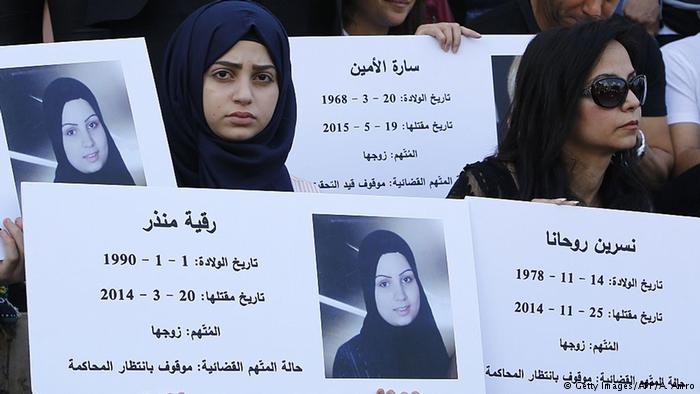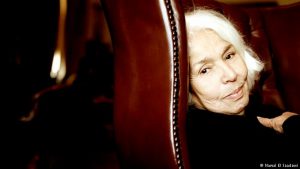The battle for women’s freedom and equality – “Uncensored” presents a look behind the veil

A new book “Usensurert” (Uncensored) by Norwegian journalist Birgitte C. Huitfeldt presents a look behind the veil of what it means to be a woman in the Muslim world. Jan Tomes talked to her about their concerns.
The Middle East is usually written about as a place of wars, conflicts, and revolutions. But the biggest one – the battle for women’s freedom and equality – is still to be fought, as shown in Birgitte C. Huitfeldt’s latest book “Usensurert” (Uncensored), which was just released in Norway.
Huitfeldt picked 10 prominent feminist figures from 10 Middle Eastern countries, including Egyptian women’s rights advocate Nawal El Saadawi, Iranian lawyer and Nobel Peace Prize winner Shirin Ebadi, Saudi Ambassador Mehla Ahmed Talebna and investigative journalist Rana Husseini from Jordan.

Mehla Ahmed Talebna
DW: What surprised me about the book was that the women you chose to interview, except for Mehla Ahmed Talebna, talked very little about Islam and Islamic fundamentalism. Why is that since the topic is essential to women’s rights in the region?
Birgitte C. Huitfeldt: Those women are uncensored in much of their daily work, but they still can’t talk freely about social and gender topics in the context of religion and religious matters.
So I kept the book focused on family structures, patriarchy, women’s rights, and the laws that need to change to ensure equality for all women in the Middle East.
I think a new generation of women must emerge in the Muslim world who will want to talk about Islam and challenge it.
Hajer Sharief, a 24-year-old activist from Libya, represents that young generation. Do you sense some generational shifts in attitudes or means in fighting for women’s rights in the region?
Sharief is a child of this war – she experienced the civil war in Libya in 2011 as an adolescent – which shaped her to become an activist and a spokeswoman for peace. Sharief works for all the young people in her country by speaking up for them and encouraging them to rise together against wars and oppression and toward freedom, individual choice and peace.
The way of working for better conditions for all young people is typical for Sharief’s generation; she is fearless, practical, and optimistic.

Nawal El Saadawi
On the other hand, Egyptian feminist Nawal El Saadawi told you that she wouldn’t participate in the book if you also interviewed a woman from Israel. Do disputes between nations and religions paralyze women in the Middle East to come together and fight together?
She told me that during our first meeting in Cairo in 2014, so I asked her if she could send me a few lines outlining her views concerning this matter, but she never replied. Her answer might have been interesting, but her silence is just as well.
The women who want to silence their neighbors and sisters create fear. That is not the feminism we would like to develop in democratic societies; this is applied patriarchy between sovereign women.
How are women perceived in the contemporary Middle Eastern societies?
From the talks, it was interesting for me to learn how much old structures still rule the Middle Eastern societies today, and how difficult it is to distinguish between Islamic fundamentalism and everyday oppressing family codes or patriarchal suppression of women.
I am talking here about honor-related violence in the name of Islam but also about the notion that women are men’s property. There is still a long way to change women’s position and status within the patriarchal Muslim family.
Generally, the more poverty, war, and weapons are present in the country, the more oppression and violence are applied against women. That is not exclusive to the Middle East, however. Women are the weakest targets when they do not have their independence, and in the Muslim family, girls learn that they are worthy only the half of their brother.

Canan Arin
The interview with Canan Arin is shocking in many ways: How is it possible that Turkey, which has applied to accede the EU, sentences a woman for standing for women’s rights and against marriages with girls who are minors, or honor killings, which are still present in the country?
The way Turkey treats their women is nothing but a shame! Turkey is now competing with the most backward countries in the Middle East.
President Erdogan is breaking every obliged social and democratic rule of human dignity and rights by censorship and social punishment. He silences everything and everybody opposing him and his regime.
But at the same time, we see that a new generation of young women are making their ways out of this world through social media and are tearing down the patriarchal wall by not tolerating to be silenced and stigmatized as “the other gender.”
Does the Western society – and the contemporary Western feminism in particular – understand Middle Eastern women and their needs?
You need to be more than a feminist to be able to understand the Arab world and the real needs of the Middle Eastern women, and I don’t think Western feminism has the urge and the knowledge to do so. The imperialistic narrative on Middle Eastern women is still well alive in 2017, restricting communications between “us” and “them” instead of broadening it.
I think that we all have to step out of our cocoons of good intentions wanting to change other women and their way of living to become more like us. Instead, we have to get into a dialogue with them, and understand what our differences are, and how they have emerged. We, Western feminists, have to change our mindset toward Middle Eastern women, which is a challenging task for all of us.
Interview: Jan Tomes
_____
WTO RECOMMENDS
Uncensored: Muslim women speak about women’s rights
A new book “Usensurert” (Uncensored) by Norwegian non-fiction writer and journalist Birgitte C. Huitfeldt takes a look behind the veil of what it means to be a woman in the Muslim world. (From July 4, 2017)
Step By Step, These Muslim Women Break Stereotypes
Lucknow (Women’s Feature Service) – Nasreen, 32, does not have a second name. A few years ago she had no income either. All that this purdah-clad mother-of-four had was a little experience in stitching. Like countless other Muslim women from conservative homes in Lucknow, Uttar Pradesh, Nasreen, too, was forbidden to step out of her home. (From January 22, 2015)
Nearly all India’s Muslim women reject ‘triple talaq’ and polygamy (I)
More than 90 percent of Muslim women surveyed in India want the “triple talaq” divorce ritual and polygamy banned from family civil law in the country, a study by a women’s rights organization, the Bharatiya Muslim Mahila Andolan (BMMA), showed. (From September 4, 2015)



